Moody, broody and wild … precisely how I love short stories to be. And these are some of the best I read in 2023.
‘Anyone Can Do It’ by Manuel Muñoz
Muñoz creates a mood in his latest collection of stories which I love and ‘Anyone Can Do It’ is especially evocative. The stories in The Consequences are set in the 1980s in the small towns that surround Fresno, and Muñoz depicts the Mexican and Mexican American farmworkers and the desperation, resilience and glints of tenderness found in their lives and choices. In a recent essay, he wrote: ‘I write fiction because I am often trying to get at the emotional mystery of a glance or an unspoken exchange or a decision made in a moment. Whatever might reside in the unsayable has always seemed most potent to me …’
‘Sundays were always so peaceful, Delfina thought, no matter where you were, so serene she imagined the birds themselves had gone dumb. El día de Dios, she thought, and remembered Sundays when her white-haired father had not yet slept out the drunkenness of the previous night. Her own husband had sometimes broken the sacredness of a Sunday silence and she was oddly thankful for the calm of this orchard moment that had been brought on only by his absence. Delfina looked down the row to soak in that blessed quiet and the longer she looked, the emptier and emptier it became. The empty row where, she realized, Lis had disappeared like a faraway star.’
Manuel Muñoz is the author of two previous collections and a novel. He is the recipient of a Whiting Writers Award, three O. Henry Awards, and has appeared in Best American Short Stories. ‘Anyone Can Do It’ features in his collection The Consequences, which won the 2023 Joyce Carol Oates Prize, was a finalist for the 2023 Aspen Words Literary Prize and longlisted for the 2022 Story Prize. A native of Dinuba, California, and a first-generation college student, Manuel graduated from Harvard University and received his MFA in creative writing at Cornell University. He currently lives and works in Tucson, Arizona.
‘The Edge of the Shoal’ by Cynan Jones
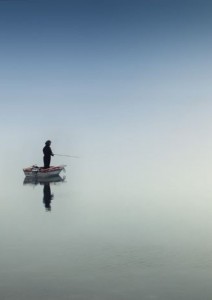 This story won the BBC National short story award in 2017 and I agree with prize judge Eimear McBride who said it’s ‘as perfect a short story as I’ve ever read’.
This story won the BBC National short story award in 2017 and I agree with prize judge Eimear McBride who said it’s ‘as perfect a short story as I’ve ever read’.
‘He’s had to go through so many possessions, things that exploded with memories during the past few weeks; but it is the opposite with the ashes. He tries to hold away the fact they know nothing of what they are. Wants to remind the ashes of events, moments. To make them the physical thing of his father …
‘He has a sense, out here, of peace. Thinks, Why do we stop doing the things we enjoy and the things we know are good for us?
‘When he had fetched the kayak out from under the tarp, there were cobwebs, and earwigs in among the hatch straps.
‘He had not told her he was going. He’d expected it to be a weight he wanted to lift by himself.’
Cynan Jones is an acclaimed fiction writer from the west coast of Wales. His work has appeared in over twenty countries, and in journals and magazines including Granta, Freeman’s and the New Yorker. He has also written a screenplay for the hit crime drama Hinterland, a collection of tales for children, and a number of stories for BBC Radio. He has been longlisted and shortlisted for numerous awards, and won, among other prizes, the Wales Book of the Year Fiction Prize, a Jerwood Fiction Uncovered Award, and the BBC National Short Story Award. His latest book is Stillicide a collection of inter-connected stories that aired on BBC Radio 4 in 2019.
‘The Hyena’ by TC Boyle
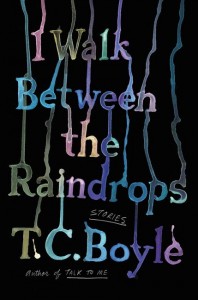
‘The Hyena’ is from TC Boyle’s collection I Walk Between the Raindrops. The story centres on an outbreak of deranged hallucinations in a French village and it is an intriguing and rather lovely story from a book that contains several tales that are just as satisfying.
It begins simply: ‘That was the day the hyena came for him, and never mind that there were noyenas in the South of France, and especially not in Pont-Saint-Esprit—it was there and it came for him.’ The pivot point towards the end of the story is also unexpected and good: ‘No one there that afternoon, including Maxime Bonnet and his wife, whether they’d eaten poisoned bread or consumed a jeroboam of wine, could have doubted what was happening before their eyes: it was a match.’
T.C. Boyle is an American novelist and short-story writer. Thomas Coraghessan Boyle is an American novelist and short story writer. Since the mid-1970s, he has published 19 novels and 12 collections of short stories. Most recently, he has been the recipient of the Mark Twain American Voice in Literature Award, the Henry David Thoreau Prize, and the Jonathan Swift Prize for satire. He is a Distinguished Professor of English Emeritus at the University of Southern California and lives in Santa Barbara.
‘New Year’s Eve’ by Anne Casey-Hardy
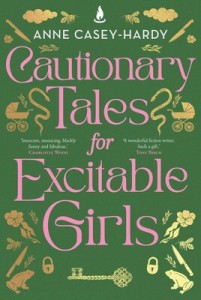 Cautionary Tales for Excitable Girls contains some fabulous stories and ‘New Year’s Eve’ is one of them. Teenagers sneak out to the creek for a wild New Year’s Eve party and Kendall, a quiet girl, holds ‘a whole circle of mostly boys under a spell’. Her arms are spread-eagled and people start stroking her but instead of joining in, the narrator creeps away. Then, she says:
Cautionary Tales for Excitable Girls contains some fabulous stories and ‘New Year’s Eve’ is one of them. Teenagers sneak out to the creek for a wild New Year’s Eve party and Kendall, a quiet girl, holds ‘a whole circle of mostly boys under a spell’. Her arms are spread-eagled and people start stroking her but instead of joining in, the narrator creeps away. Then, she says:
‘The ground beneath my feet shook and the night exploded with kids running, screaming and yelling, crashing through the bush chasing each other. A sweaty stink gusted through the air. … It was a game, maybe some version of the Ivan Milat story.’
Read Hardy’s story to find out what happens next.
Anne Casey-Hardy is an award-winning fiction writer who lives and writes in Melbourne’s west, on Bunurong land. Cautionary Tales for Excitable Girls, published by Scribner, is her first book. Cautionary tales for Excitable Girls was named in Australian Book Review’s Books of the Year for 2022 and Yves Rees from ABR writes: Anne Casey-Hardy creates little shards of stories that distil all the violence and mystery and drama of girlhood into a few scant pages.’
‘The Other One’ by Tessa Hadley
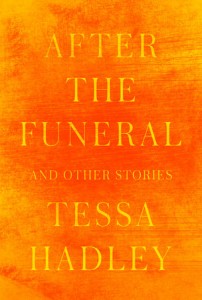 After the Funeral and Other Stories by Tessa Hadley is an elegant collection and shows why Hadley is highly praised as a master of the form. Chimamanda Ngozi Adichie, author of Americanah, says, ‘She has such great psychological insights into human beings, which is rare … One of the best fiction writers writing today.’
After the Funeral and Other Stories by Tessa Hadley is an elegant collection and shows why Hadley is highly praised as a master of the form. Chimamanda Ngozi Adichie, author of Americanah, says, ‘She has such great psychological insights into human beings, which is rare … One of the best fiction writers writing today.’
‘The Other One’ hinges on a chance meeting at a party, after which forty-something Heloise enrols her child in a Suzuki violin class. She soon discovers that the instructor, Delia, holds the key to her own past and in particular the car accident that her father died in while travelling in Europe with two young women (one of whom is his lover). Hadley’s descriptions of the people in this story are priceless.
‘Heloise didn’t have her mother’s gift of lightness. Angie was tall and thin, stooped, flossy, grey silk mingled in her messy, faded hair. Vague and charming, she had escaped from a posh county family whose only passionate feelings, she said, were for dogs and property. Heloise was stocky, top-heavy with bosom, and serious, with thick, kinked tobacco-brown hair and concentrating eyes; she looked more like her father, whose family had come to the East End of London from Lithuania in the early twentieth century. …
‘Delia was older than the rest of them, with a lined, tanned, big-boned face and alert, frank, open gaze; her dark hair was streaked with grey and cut in a gamine style, fringe falling into her eyes, that made her look Italian, Heloise thought: like an Italian intellectual.’
Tessa Hadley is the author of eight highly praised novels, Accidents in the Home, which was longlisted for the Guardian First Book Award, Everything Will Be All Right, The Master Bedroom, The London Train, Clever Girl, The Past, Late in the Day, Free Love and three collections of stories, Sunstroke, Married Love and Bad Dreams. She won the Windham Campbell Prize for Fiction in 2016, The Past won the Hawthornden Prize for 2016, and Bad Dreams won the 2018 Edge Hill Short Story Prize. Her stories appear regularly in the New Yorker.
‘Words for Things’ by Lucy Caldwell
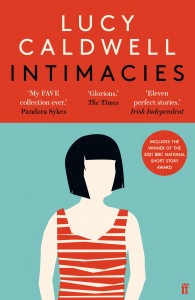 Intimacies by Lucy Caldwell includes ‘All the People Were Mean and Bad’ which won the 2021 BBC National Short Story Award. The remaining 10 stories are equally polished and strange – steering us through the love, loss and exile of modern life.
Intimacies by Lucy Caldwell includes ‘All the People Were Mean and Bad’ which won the 2021 BBC National Short Story Award. The remaining 10 stories are equally polished and strange – steering us through the love, loss and exile of modern life.
Author, Lucy Caldwell, says ‘“Words for Things” is about ‘The way time tilts and slips and suddenly accordions. The casual moments where you realise that all that you took for granted was wrong. “Words for Things” is about all of these things, and so much else I still don’t have the words for.’
I feature ‘Words for Things’ here because of how brilliantly it captures these kinks in time and because Sinéad O’Connor (who appears in the story) died in July 2023 – and suddenly all the fiery passion and courage of her younger self landed in our hearts and minds again.
‘Do you remember, I said when my husband came back, Sinéad O’Connor ripping up the picture of the Pope?
‘Vaguely, he said. Not really.
‘Here, look, I said, and I found it on my phone.
‘She’d been performing on the American programme Saturday Night Live. In rehearsal, she’d held up a picture of orphaned children. We have confidence in the victory of good over evil. But when she did it live, the picture was of Pope John Paul II and she ripped it up, once, twice, three times, and scattered the pieces. Fight the real enemy, she said, looking straight at the camera. The clip ended with her taking off her headset and blowing out the church pillar candles on the table beside her.
‘We watched the twenty-nine seconds again, and then again. Every time, you felt something creeping up and down your spine.
‘Bloody hell, my husband said.’
Lucy Caldwell is the award-winning author of four novels, several stage plays and radio dramas, and two collections of short stories: Multitudes (Faber, 2016) and Intimacies (Faber, 2021). Her most recent novel, These Days, published in 2022, won both the 2022 EM Forster Prize and the 2023 Walter Scott Prize for Historical Fiction. Her new collection of stories, Openings, will be published in May 2024.
‘Nothing, Darling, Only Darling, Darling’ by Elizabeth McCracken
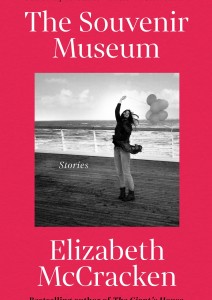 I love Elizabeth McCracken’s work, and her short story collection The Souvenir Museum is no exception. ‘Nothing, Darling, Only Darling, Darling’ stuck in my mind for weeks and I can still see the little canal boat that Sadie and Jack are holidaying on in Amsterdam. Ostensibly, they’re honeymooning but they’re also dealing with some tragic family circumstances. Their later-in-life marriage follows 20 years as partners – so they can be a bit wry and a scratchy with one another … but they’re also just being tourists in a city flooded with tourists.
I love Elizabeth McCracken’s work, and her short story collection The Souvenir Museum is no exception. ‘Nothing, Darling, Only Darling, Darling’ stuck in my mind for weeks and I can still see the little canal boat that Sadie and Jack are holidaying on in Amsterdam. Ostensibly, they’re honeymooning but they’re also dealing with some tragic family circumstances. Their later-in-life marriage follows 20 years as partners – so they can be a bit wry and a scratchy with one another … but they’re also just being tourists in a city flooded with tourists.
‘There was a liquor store around the corner, selling mulled wine dispensed from a sort of stainless-steel suburban samovar that Sadie remembered from elementary school functions. “This is very good,” the liquor-store proprietor promised them, working the spigot. He was in his forties, with a saddlebag goatee, wider at the bottom. “This will make you love each other truly.”
“What if we already love each other truly?” asked Jack.
“Why, I don’t know,” said the shopkeeper. “You’d be the first instance in my shop.”
The walls were lined with bottles. Jack pulled a Dutch liqueur from a shelf. “My father would appreciate this place,” he said, and just then an American man walked in, looked around, and said, “Do you sell bread?”
“Do I sell bread? The shopkeeper said. “Do I sell bread? Look around you, man! What sort of place do you believe you have found yourself in? No, no, don’t go away, you’re in luck. We have here on exhibition a mythical creature: the man and wife in truly love with each other. Look!” said the shopkeeper. “Marvel.”
“I love my wife,” said the bread-seeking American.
“No,” said the liquor-store owner, “you don’t”.
Elizabeth McCracken is the author of eight books: Here’s Your Hat What’s Your Hurry, The Giant’s House, Niagara Falls All Over Again, An Exact Replica of a Figment of My Imagination, Thunderstruck & Other Stories, Bowlaway, The Souvenir Museum, and The Hero of This Book. Thunderstruck & Other Stories won the 2015 Story Prize. Her work has been published in The Best American Short Stories, The Pushcart Prize, The O. Henry Prize, The New York Times Magazine, and many other places. She teaches at the University of Texas at Austin, and in the low residency MFA program at Bennington College.
‘Ten days in Haifa’ by Rashia Murphy
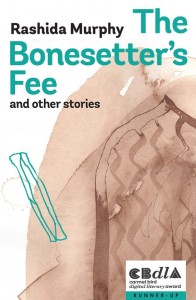 Rashida Murphy’s The Bonesetter’s Fee And Other Stories is a compelling collection. It probes the migrant experience, examines how relationships build and break, and celebrates the resilience of women and girls in the face of discrimination and humiliation. It’s also witty and intriguing and fun.
Rashida Murphy’s The Bonesetter’s Fee And Other Stories is a compelling collection. It probes the migrant experience, examines how relationships build and break, and celebrates the resilience of women and girls in the face of discrimination and humiliation. It’s also witty and intriguing and fun.
Murphy’s 20 short stories and flash fiction showcase her dextrous description, perceptive characterisation, and engaging dialogue. In ‘Ten days in Haifa’ a woman takes her teenage daughter on a trip to Israel to escape a husband she admits she would have killed if she hadn’t got away from him. I love this exchange mother and child have in their hotel …
‘She turned as if she knew my eyes were on that tattoo, stretched her shirt over it defensively and eyed me. I looked away. “Do you think that boy speaks any English? The blue-eyed one at the supermarket? He was staring at me.”
‘“He’s Jewish. He has a gun. He doesn’t need to speak any English.”
‘“Gee, you’re in a mood. What’s up Mum? Spirituality not working for you then?
‘“Let’s not do this, okay? Think about what you’ll be able to tell the girls at home. ‘How many kids your age get to travel to exotic, dangerous places like these? Let’s go and find out if your blue-eyed boyfriend speaks any English. You must be feeling alright if you’re insulting me again.’
Rashida Murphy is a writer, poet, reviewer and blogger. She has published her short fiction and poetry in various international literary journals and anthologies and her debut novel, The Historian’s Daughter was shortlisted in the Scottish Dundee International Book Prize in 2015. The Bonesetter’s Fee and Other Stories was Shortlisted for the NSW Premier’s Literary Awards 2023 and Runner Up for the 2021 Carmel Bird Digital Literary Award. Rashida has a Masters in English Literature and a PhD in Writing from Edith Cowan University. In 2016 she was the joint winner of the Magdalena Prize for feminist research for her thesis which includes the novel The Historian’s Daughter.

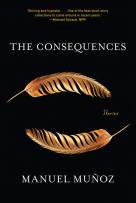


Recent Comments